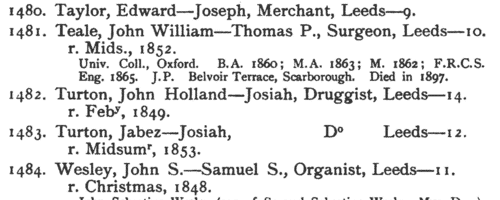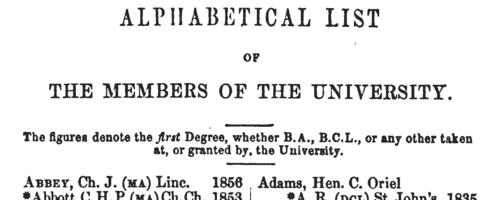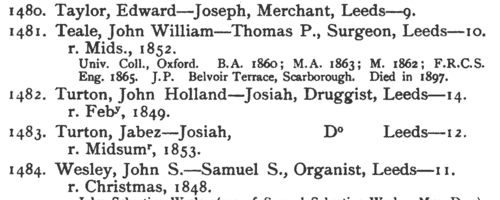Jowitt Surname Ancestry ResultsOur indexes 1000-1999 include entries for the spelling 'jowitt'. In the period you have requested, we have the following 98 records (displaying 31 to 40): Single Surname Subscription | | | Buying all 98 results of this search individually would cost £518.00. But you can have free access to all 98 records for a year, to view, to save and print, for £100. Save £418.00. More... |
These sample scans are from the original record. You will get scans of the full pages or articles where the surname you searched for has been found. Your web browser may prevent the sample windows from opening; in this case please change your browser settings to allow pop-up windows from this site. Boys at Leeds Grammar School
(1856)
The admission books for Leeds Grammar School from 1820 to 1900 were edited by Edmund Wilson and published in 1906. The series of registers is almost complete for the period, there being in addition admission registers for the Lower (or Commercial) Department from 1856 to 1865, and lists of boys in the school in 1856, and in the Commercial Department in 1861. The entries are arranged by date or term of admission: a sequential number is given first, then surname, christian name, and, after a dash, father's christian name, occupation, and address; another dash, and then the age of the boy at admission, and often his year of leaving (with the abbreviation r. for 'removed' or 'left'). r.* means left without notice; (o) or S. or Stranger or Foreigner indicates a boy not on the foundation. The editor was unable to divine the meaning of the abbreviation (Q) or the asterisks prefixed to most entries in 1856 to 1860, but dutifully copies them into the text. In smaller type he then proceeds, where possible, to add some information about the boy's subsequent career.JOWITT. Cost: £4.00.  | Sample scan, click to enlarge

| Dissolutions of Partnerships
(1856)
Trade partnerships dissolved, or the removal of one partner from a partnership of several traders, in England and Wales
JOWITT. Cost: £6.00.  | Sample scan, click to enlarge

| Schoolmasters and trainees with Certificates of Merit
(1856)
The Committee of Council on Education for England and Wales produced an annual report which included several lists of teachers and trainee teachers, including an Annual Calendar of Teachers who have Obtained Certificates of Merit (completed to 1 January 1856), from which this sample scan is taken. The teachers are listed alphabetically by surname and initial, with name of school, post town or county, and grade, as either certificate or class. Student teachers were classed at the end of each year of training, so the column for class shows a student's class (1, 2 or 3) at the end of their first or second year of training. The teacher may then be awarded a certificate of merit by Her Majesty's Inspector, in which case the class and division of the certificate awarded appears in the columns for Certificate. No certificate of merit was granted a student, as a teacher, until he or she had been for two years in charge of the same elementary school, and the certificate was granted on the basis of two reports of performance as a teacher in school. If the first report was favourable, the teacher was paid for the first year on the scale of the lowest class; if the second report was favourable, augmentation and class of certificate was fixed for the next five years, after which (and so on from time to time) the certificates were open to revision. The value of the certificate, in the first instance, was not fixed higher than the first division of the third class, for any student who had resided less than two years at a training school under inspection. This is the index to the schoolmasters and male students in training schools. JOWITT. Cost: £6.00.  | Sample scan, click to enlarge

| Anglican Clergy in England and Wales
(1858)
The Clergy List for 1858 includes this comprehensive list of Anglican clergymen in England and Wales, whether beneficed or not. The names are arranged alphabetically by surname, and christian name or initials, with degree, and current office.JOWITT. Cost: £4.00.  | Sample scan, click to enlarge

| Bankrupts' Estates
(1858)
Bankrupts' estates for England and Wales vested in assignees: bankruptcy often caused people to restart their lives elsewhere, so these are an important source for lost links
JOWITT. Cost: £6.00.  | Sample scan, click to enlarge

| Insolvents
(1858)
Insolvency notices for England and Wales: insolvency often caused people to restart their lives elsewhere, so these are an important source for lost linksJOWITT. Cost: £6.00.  | Sample scan, click to enlarge

| Members of Oxford University
(1860)
The Oxford University Calendar for 1860 includes this list of all living members of the university, i. e. not only undergraduates and members of staff, but also all surviving graduates from earlier generations. The names are arranged alphabetically by surname, then by college in order of foundation. Surnames are given, initials, highest degree, name of college, and then the year of graduating the first degree. For undergraduates only name and college is given. An asterisk before a surname indicates a member on the foundation of the college. JOWITT. Cost: £4.00.  | Sample scan, click to enlarge

| Boys entering Leeds Grammar School: Upper (Classical) Department
(1861)
The admission books for Leeds Grammar School from 1820 to 1900 were edited by Edmund Wilson and published in 1906. The series of registers is almost complete for the period, there being in addition admission registers for the Lower (or Commercial) Department from 1856 to 1865, and lists of boys in the school in 1856, and in the Commercial Department in 1861. The entries are arranged by date or term of admission: a sequential number is given first, then surname, christian name, and, after a dash, father's christian name, occupation, and address; another dash, and then the age of the boy at admission, and often his year of leaving (with the abbreviation r. for 'removed' or 'left'). r.* means left without notice; (o) or S. or Stranger or Foreigner indicates a boy not on the foundation. The editor was unable to divine the meaning of the abbreviation (Q) or the asterisks prefixed to most entries in 1856 to 1860, but dutifully copies them into the text. In smaller type he then proceeds, where possible, to add some information about the boy's subsequent career.JOWITT. Cost: £4.00.  | Sample scan, click to enlarge

| Long-stay Paupers in Workhouses: Kingston-upon-Hull
(1861)
This comprehensive return by the Poor Law Board for England and Wales in July 1861 revealed that of the 67,800 paupers aged 16 or over, exclusive of vagrants, then in the Board's workhouses, 14,216 (6,569 men, 7,647 women) had been inmates for a continuous period of five years and upwards. The return lists all these long-stay inmates from each of the 626 workhouses that had been existence for five years and more, giving full name; the amount of time that each had been in the workhouse (years and months); the reason assigned why the pauper in each case was unable to sustain himself or herself; and whether or not the pauper had been brought up in a district or workhouse school (very few had). The commonest reasons given for this long stay in the workhouse were: old age and infirm (3,331); infirm (2,565); idiot (1,565); weak mind (1,026); imbecile (997); and illness (493). JOWITT. Cost: £6.00.  | Sample scan, click to enlarge

| Long-stay Paupers in Workhouses: Leeds Township (Yorkshire)
(1861)
This comprehensive return by the Poor Law Board for England and Wales in July 1861 revealed that of the 67,800 paupers aged 16 or over, exclusive of vagrants, then in the Board's workhouses, 14,216 (6,569 men, 7,647 women) had been inmates for a continuous period of five years and upwards. The return lists all these long-stay inmates from each of the 626 workhouses that had been existence for five years and more, giving full name; the amount of time that each had been in the workhouse (years and months); the reason assigned why the pauper in each case was unable to sustain himself or herself; and whether or not the pauper had been brought up in a district or workhouse school (very few had). The commonest reasons given for this long stay in the workhouse were: old age and infirm (3,331); infirm (2,565); idiot (1,565); weak mind (1,026); imbecile (997); and illness (493). JOWITT. Cost: £6.00.  | Sample scan, click to enlarge

|
Research your ancestry, family history, genealogy and one-name study by direct access to original records and archives indexed by surname.
|












